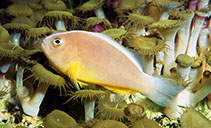| Family: |
Pomacentridae (Damselfishes), subfamily: Pomacentrinae |
| Max. size: |
11 cm SL (male/unsexed) |
| Environment: |
reef-associated; marine; depth range 3 - 25 m, non-migratory |
| Distribution: |
Indo-West Pacific: East Africa, Madagascar, Comoro Islands, Seychelles, Andaman Sea, Sumatra and the Seribu Islands (Java Sea). Not found in Maldives and Sri Lanka (Ref. 4391). |
| Diagnosis: |
Dorsal spines (total): 8-9; Dorsal soft rays (total): 17-20; Anal spines: 2-2; Anal soft rays: 12-14. Description: Overall color is orange, with a thin white stripe (very narrow) running along the back from top of the head to caudal peduncle (Ref. 7247). The white stripe extends from the snout but does not touch the lips. Dorsal and caudal fins white. Body depth 2.1-2.5 in SL (Ref. 90102). |
| Biology: |
Found in shallow inshore reef habitats, often in strong current zones to about 15 m depth (Ref. 48636). Are protandrous hermaphrodites (Ref. 55367). Each pair is monogamous (Ref. 55367). Each anemone with a large female, a smaller functional male and several stunted juveniles; with the removal of the female, the male changes sex and the largest of the juveniles develops into a functional male (Ref. 4391). Oviparous, distinct pairing during breeding (Ref. 205). Eggs are demersal and adhere to the substrate (Ref. 205). Males guard and aerate the eggs (Ref. 205). Associated with the anemones: Heteractis magnifica, and Stichodactyla mertensii (Ref. 5911). May be reared in captivity (Ref. 35420). |
| IUCN Red List Status: |
Least Concern (LC); Date assessed: 17 November 2010 Ref. (130435)
|
| Threat to humans: |
harmless |
Source and more info: www.fishbase.org. For personal, classroom, and other internal use only. Not for publication.
